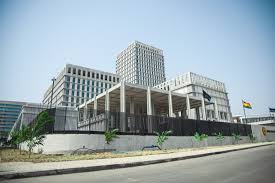Despite Strengthened Equity, Bank of Ghana Records GH¢9.49 Billion Operating Loss in 2024

The Bank of Ghana (BoG) has posted an operating loss of GH¢9.49 billion for the 2024 fiscal year, marking a reduction from the restated GH¢13.23 billion loss recorded in 2023. The central bank’s newly released financial statements show that, although challenges persist, some gains have been made in restoring financial stability.
According to the report, BoG’s total income for the year amounted to GH¢9.40 billion. However, operating expenses soared to GH¢18.89 billion, resulting in a shortfall of nearly GH¢9.5 billion. While the bank remains under financial strain, this performance represents a modest improvement from the previous year’s deeper deficit.
Cost Drivers Behind the Deficit
The financial setback in 2024 was largely driven by three primary factors. The most significant was the cost of open market operations, which totaled GH¢8.60 billion. These operations, which involve the buying and selling of government securities to regulate money supply and inflation, are essential tools of monetary policy—but they come with considerable financial costs.
Secondly, the Bank recorded exchange rate and revaluation losses amounting to GH¢3.49 billion. A major portion of this—approximately GH¢1.82 billion—was attributed to the government’s Gold-for-Oil programme, which exposed the Bank to foreign exchange fluctuations and commodity-related financial risks.
The third contributor to the loss was an increase in the cost of printing and distributing currency. Currency issuance expenses rose to GH¢1.01 billion in 2024, up from GH¢0.69 billion in 2023, reflecting both higher operational demands and inflationary pressures on production.
Encouraging Signs in Net Worth
Despite the operational loss, the BoG reported a net comprehensive gain of GH¢4.02 billion for the year. This marks a major turnaround from the GH¢9.19 billion net comprehensive loss recorded the previous year. This gain was largely due to changes in the valuation of key assets, including Ghana’s gold reserves, Special Drawing Rights (SDRs), and foreign investments.
These accounting adjustments helped improve the Bank’s equity position, though it remains in negative territory. The BoG’s total equity stood at a deficit of GH¢61.32 billion by the end of 2024—an improvement over the GH¢65.34 billion deficit reported in 2023. This upward trend, while still concerning, indicates that the Bank’s efforts to stabilize its finances may be gradually yielding results.
Significant Growth in Asset Base
The central bank’s total assets experienced notable growth during the year, rising from GH¢140.41 billion in 2023 to GH¢215.06 billion in 2024. This expansion suggests a more active role in both domestic and international financial markets and highlights the Bank’s continued efforts to manage macroeconomic risks and liquidity pressures.
Commitment to Governance and Stability
In its official communication accompanying the release of the financial results, the Bank of Ghana reaffirmed its dedication to financial transparency and sound governance. The Bank reiterated its core mandate: to ensure monetary stability, regulate inflation, and provide a strong foundation for economic development.
Despite the challenges outlined in the report, the BoG emphasized that it remains focused on steering Ghana’s economy through turbulent times. Its interventions—though financially taxing—are aimed at securing long-term stability and protecting the interests of the Ghanaian public.
As the central bank continues its recovery efforts, analysts will be watching closely to see whether its policy tools and governance reforms are sufficient to reverse the trend of prolonged operating losses.







